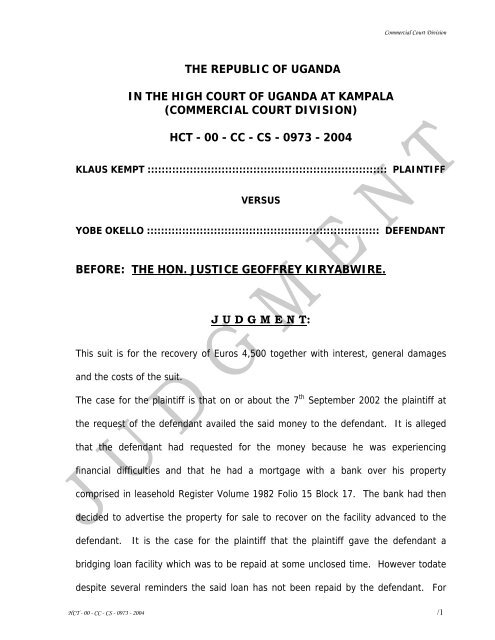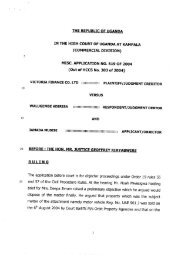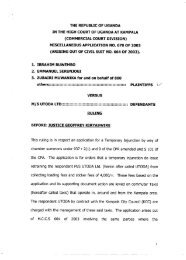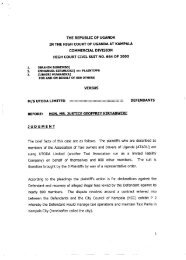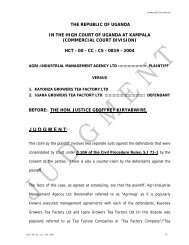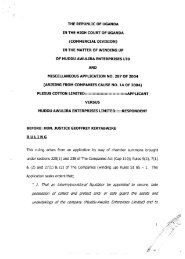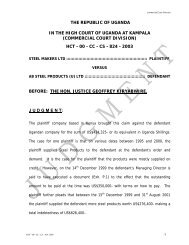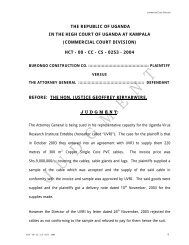Klaus Kempt V Yobe Okello - Hon. Justice Kiryabwire Geoffrey
Klaus Kempt V Yobe Okello - Hon. Justice Kiryabwire Geoffrey
Klaus Kempt V Yobe Okello - Hon. Justice Kiryabwire Geoffrey
- No tags were found...
You also want an ePaper? Increase the reach of your titles
YUMPU automatically turns print PDFs into web optimized ePapers that Google loves.
Commercial Court Division<br />
THE REPUBLIC OF UGANDA<br />
IN THE HIGH COURT OF UGANDA AT KAMPALA<br />
(COMMERCIAL COURT DIVISION)<br />
HCT - 00 - CC - CS - 0973 - 2004<br />
KLAUS KEMPT :::::::::::::::::::::::::::::::::::::::::::::::::::::::::::::::::::: PLAINTIFF<br />
VERSUS<br />
YOBE OKELLO :::::::::::::::::::::::::::::::::::::::::::::::::::::::::::::::::: DEFENDANT<br />
BEFORE: THE HON. JUSTICE GEOFFREY KIRYABWIRE.<br />
J U D G M E N T:<br />
This suit is for the recovery of Euros 4,500 together with interest, general damages<br />
and the costs of the suit.<br />
The case for the plaintiff is that on or about the 7 th September 2002 the plaintiff at<br />
the request of the defendant availed the said money to the defendant. It is alleged<br />
that the defendant had requested for the money because he was experiencing<br />
financial difficulties and that he had a mortgage with a bank over his property<br />
comprised in leasehold Register Volume 1982 Folio 15 Block 17. The bank had then<br />
decided to advertise the property for sale to recover on the facility advanced to the<br />
defendant. It is the case for the plaintiff that the plaintiff gave the defendant a<br />
bridging loan facility which was to be repaid at some unclosed time. However todate<br />
despite several reminders the said loan has not been repaid by the defendant. For<br />
HCT - 00 - CC - CS - 0973 - 2004 /1
Commercial Court Division<br />
the defendant it is not denied that he received Euros 4,500 from the plaintiff.<br />
However it is denied that the money was loan. It is the case for the defendant that<br />
the money was for rent due from the plaintiff to the defendant. As it transpired the<br />
plaintiff and the defendant were old friends. At one point in time between 1986 and<br />
1988 the defendant had stayed with the plaintiff at his residence in Cologne Germany.<br />
Then at a later point in time the plaintiff for a period of 43 months from October 2000<br />
to April 2004 stayed at the residence of the defendant in Bukoto, Kampala. The<br />
plaintiff also claimed the value a computer tap top and printer supplied to the<br />
defendant at a cost of Ug.Shs.5,400,000/=. It is the case for the defendant by way<br />
of counterclaim that the plaintiff did not pay the due rent which by April 2004 had<br />
accumulated to US$8,600. As to the said laptop the defendant pleaded that it<br />
belonged to the plaintiff who merely left it at the defendant’s home when he stopped<br />
staying there.<br />
At the scheduling conference it was agreed that the laptop computer and printer be<br />
returned to the plaintiff by the defendant by depositing it into Court. This after a<br />
while was done and consequently resolved the dispute relating to the laptop.<br />
Furthermore at the scheduling conference it was agreed that the defendant’s property<br />
was advertised for sale; that the defendant did stay at the residence of the plaintiff in<br />
Germany between 1986 and 1988; that the plaintiff did stay at the residence of the<br />
plaintiff in Uganda between 2000 and 2004 and that none of the parties paid any rent<br />
to the other, while staying at the others residences.<br />
HCT - 00 - CC - CS - 0973 - 2004 /2
Commercial Court Division<br />
Four issues were set down for determination by Court.<br />
1) Whether the Euros 4,500 was a loan to be paid back.<br />
2) Whether the defendant was in breach of the loan agreement.<br />
3) Whether the plaintiff is under obligation to pay rent for occupation of<br />
the defendant’s premises<br />
4) Remedies.<br />
Mr. Innocent Taremwa appeared for the plaintiff while Mr. Tom Balinda appeared for<br />
the defendant. Only the plaintiff and defendant testified. There was no third party<br />
evidence.<br />
Issue No. 1:<br />
Whether the Euros 4,500 was a loan to be paid back.<br />
The facts surrounding the Euros 4,500 are fairly straight forward. The defendant<br />
conceded receiving the money through various money transfer company.<br />
The purpose of the money is what is in dispute. The case for the plaintiff is that it<br />
was loan to enable the defendant clear his obligations with his bank so that his home<br />
which was the subject of a mortgage was not sold.<br />
From the evidence adduced in Court there is no written agreement as to the purpose<br />
of this money.<br />
So it is really a case of the plaintiff’s word against that of the<br />
defendant. According to the testimony of the plaintiff, the defendant promised to<br />
repay him from the sale of Sun Flower Oil and that no date was fixed as when this<br />
HCT - 00 - CC - CS - 0973 - 2004 /3
Commercial Court Division<br />
would be. It would all depend on the income of the defendant. However the<br />
plaintiff then left Uganda and went to Germany for a heart operation. On his return<br />
to Uganda in 2004 the plaintiff then inquired from defendant when his money would<br />
be repaid. It is this point that the defendant allegedly told him to leave and stop<br />
staying at his house up to this point the plaintiff claims he was not aware of any<br />
obligation to pay rent to the defendant.<br />
According to the defendant the money advanced to him would be offset against rent<br />
that the plaintiff was to pay him for staying at his house. The rent was US$200 per<br />
month. The defendant testified that this rent was never paid and this created a<br />
problem between the plaintiff and the defendant. The situation was aggravated when<br />
the defendant’s Germany Shepard Dog was poisoned. The defendant testified that he<br />
attributed the poisoning to the plaintiff who denied that he did it so he was asked to<br />
leave the house.<br />
Counsel for the plaintiff referred me to Blacks Law Dictionary 6 Ed. Pg 936 which<br />
defines a loan as;<br />
“…A lending delivery by one party to and receipt by another party of money<br />
upon agreed or express or implied to repay it with or without interest”.<br />
Counsel for the plaintiff also referred me; Chitty an Contracts 24 th Edition at Pg 3189<br />
where it stated;<br />
“If money is proved or admitted to have been paid by ‘A’ to ‘B’ and then in<br />
absence of any circumstances suggesting the<br />
HCT - 00 - CC - CS - 0973 - 2004 /4
Commercial Court Division<br />
presumption of advancement, there is prima facie, an obligation to repay the<br />
money.<br />
According, if ‘B’ claims that the money was intended as a gift, the<br />
onus is on him to prove the fact”<br />
I was also referred to the case of Selden V Davidson [1968] 1 WLR 1083.<br />
Counsel for the defendant on the other hand submitted that<br />
“…The manner of advancement shows that indeed it was a friendly loan…”<br />
However Counsel for the defendant then goes on to further submit;<br />
“…It is the plaintiff who brought an action on allegations that he lent money to<br />
the defendant. By establishing that he gave money to the defendant, the<br />
defendant (sic) (I think he meant the plaintiff) has not set up a prima facie<br />
case of a loan. if this were not the case, Courts would be floaded with cases of<br />
people who through friendliness or even philanthropy give money to others<br />
and when relations between them get sour, they came forth claim that there is<br />
a loan with an obligation to pay. This would make a mockery of justice…”<br />
I have perused the evidence adduced at trial and the submissions of both Counsel.<br />
Clearly from the evidence of the defendant he had financial difficulties with his bank<br />
DFCU Bank Ltd. The bank had advertised his property for sale on the 27 th June 2003<br />
as evidence in Exhibit P4. He testified that he received the money and that he would<br />
pay back through an offset of rent. The defendant however did not agree that this<br />
was a loan.<br />
HCT - 00 - CC - CS - 0973 - 2004 /5
Commercial Court Division<br />
Counsel for the defendant tried to make a distinction between what he termed as a<br />
friendly advance/loan and a loan. He submitted that this was a case of a friendly<br />
advance/loan and not a loan per se’. There was no written agreement nor written<br />
demand for payment. Counsel for the defendant however is not clear as to the legal<br />
effect of a friendly advance/loan as opposed to a loan per se’. Indeed one these days<br />
does see a string of cases coming up where one party or the other raises a claim or a<br />
defence based on a “friendly loan”. This is now becoming notorious enough for us at<br />
the bench to take Judicial notice of this practice. An example of another such case is<br />
Gede Rwema V Ruth Bunyenyezi HCCS 181 of 2004 (unreported) where the money<br />
was allegedly advanced for a pyramid scheme called gifting circles.<br />
However it is difficult to find a common thread between all these cases as to the legal<br />
effect of such a friendly loan. It would appear to me that what can be said of a<br />
friendly loan is that it is a loan given informally between the lender and the borrower.<br />
It can be given for a variety of reasons and each case should be handled on its own<br />
merits. However such informal facilities are expected to be paid back and that is why<br />
non payment leads to Court cases. To my mind a loan or a friendly advanced/loan is<br />
in legal terms a loan within the meaning assigned to it by Blacks Law Dictionary<br />
(supra). There is a prima facie legal obligation that it be repaid.<br />
I according find in answer to the first issue that the Euros 4,500 was a loan to be paid<br />
back.<br />
HCT - 00 - CC - CS - 0973 - 2004 /6
Commercial Court Division<br />
Issue No. 2:<br />
Whether the defendant is in breach of the loan agreement.<br />
As found in the first issue there was a loan between the plaintiff and the defendant.<br />
It was a very informal loan the terms of which are difficult to construe. As the<br />
plaintiff himself testified it was fairly open ended. That notwithstanding it had to be<br />
repaid at some stage and it is clear from the evidence that at the time of the trial<br />
about 2 years after the last disbursement this money had not been repaid. I find that<br />
the obligation to repay the money crystallized when the plaintiff demand for money.<br />
The defendant does not deny that the money was not repaid and so I find that the<br />
defendant was in general breach of the obligation to repay the money.<br />
Issue No. 3:<br />
Whether the plaintiff is under obligation to pay rent for<br />
occupying the defendant’s premises.<br />
It is the evidence of the defendant that the plaintiff at various times over a (3 years &<br />
7 months) period between October 2000 and April 2004 stayed at the defendant’s<br />
house. There was difficulty in fully describing the accommodation given to the<br />
plaintiff. However I made out that it was a guest room, bath and toilet. The rest of<br />
the facilities in the house like kitchen, domestic help, water, electricity and security<br />
were shared. The plaintiff made his own meals. The defendant testified that plaintiff<br />
3 or 4 times a year returned to Germany from Uganda but all the time his room and<br />
property would remain intact until the plaintiff returned.<br />
Like in the case of the loan of Euros 4,500 there was no rent agreement clearly<br />
making this another very informal arrangement. The defendant testified that the rent<br />
HCT - 00 - CC - CS - 0973 - 2004 /7
Commercial Court Division<br />
was US$200 per month and was never paid throughout the time the plaintiff lived<br />
with them. The plaintiff is now counterclaiming US$ 8,600 in rent.<br />
The plaintiff testified that he never contributed to electricity, water bills, and cost of<br />
house repair. He testified that he once in a while gave the security guard money<br />
when the security guard requested him. He said he was a visitor not a paying guest.<br />
Counsels for both parties had tough time submitting on this issue because not only<br />
was there no agreement there was nothing else which was written. Counsel for the<br />
defendant submitted;<br />
“…it therefore follows that the plaintiff owes the defendant rent for 43 months<br />
at the rate of USD 200 per month which totals to USD 8,600/=. The defendant<br />
having admitted that he received the Euros 4,500 as an offset of rent, the<br />
plaintiff is therefore indebted to him for the balance. Euros 4,500 is the<br />
equivalent of USD 5,850 the balance therefore is USD 2,750 which is due from<br />
the plaintiff to the defendant…”<br />
I have perused the evidence on record and the submissions of both Counsels.<br />
Unlike the issue of the loan where there was evidence of remitting of money there is<br />
no documentary evidence at all (payment by cheque, receipt, letter of demand etc) of<br />
the existence of a “tenancy” between the plaintiff and the defendant. What is clear is<br />
that the two were friends and at one time the defendant stayed with the plaintiff in<br />
Germany and now the plaintiff also stayed with the defendant in Uganda. The period<br />
HCT - 00 - CC - CS - 0973 - 2004 /8
Commercial Court Division<br />
the plaintiff stayed with the defendant of course is much longer 43 months as<br />
opposed to 7 months.<br />
It is indeed difficult to construe a tenancy if one stays at his friend’s house. One<br />
would expect that if such an arrangement did exist then the defendant should have<br />
followed up rental payments when he chased the plaintiff from his house which he did<br />
not. The defendant merely testified that he tried to find out where the plaintiff was in<br />
town to claim his money but was not successful. I find this testimony incredible<br />
coming from an old friend. It appears to me that the defendant had little motivation<br />
to follow upon the alleged USD 5,850 which was due. This in rental terms is a lot of<br />
money to be left hanging about. I agree with Counsel for the plaintiff that if this<br />
money is due and owing the legal onus is on the defendant to prove it. This he has<br />
not done. To my mind given the claim against the defendant for Euros 4,500, the<br />
whole rent claim appears to have come as an after thought to offset the amount.<br />
Objectively it would have been reasonable to expect the plaintiff as a long standing<br />
visitor to contribute to his hosts expenses in keeping him even without a formal rent<br />
relationship but this he did not do. This cannot reflect well upon him and probably<br />
was a basis for the breakdown of the friendship having stayed there for a long time.<br />
As a friend the defendant was under a moral obligation to make a contribution to his<br />
upkeep while at the plaintiff’s house as a grown person. Whatever really happened<br />
here the truth lies some where between the claim for the repayment of Euros 4,500,<br />
the death of a German Shepard Dog and the breakdown of good friendship. It is a<br />
HCT - 00 - CC - CS - 0973 - 2004 /9
Commercial Court Division<br />
pity this could not have been solved through alternative dispute resolution (ADR) an<br />
opportunity this Court gave to the parties.<br />
In answer to the third issue I find that on the evidence adduced and balance<br />
probabilities the plaintiff was under no legally binding obligation to pay rent for the<br />
occupation of the defendant’s premises.<br />
Issue No. 4:<br />
Remedies.<br />
The plaintiff prayed for the following remedies in the plaint.<br />
1. Euros 6,500.<br />
Only Euros 4,500 were proved and admitted to. I accordingly award the<br />
plaintiff Euros 4,500.<br />
2. The return of laptop computer and printer or Ug.Shs.5,400,000/= being<br />
their value.<br />
The laptop computer and printer were returned by order of Court and this<br />
rests that issue.<br />
3. Interest at 24% from the 7 th day of September till payment in full.<br />
Clearly the parties as longtime friends did not intend to create any form of<br />
commercial transaction over the loan of Euros 4,500. I find it therefore<br />
unreasonable to give any interest in this so I give none.<br />
HCT - 00 - CC - CS - 0973 - 2004 /10
Commercial Court Division<br />
4. General damages for breach of contract.<br />
Counsel for the plaintiff led no evidence as to proof of general damages.<br />
He only cited the case of Fredrick Pool Nsubuga V AG. 1993 1 KARL 33<br />
(unofficial) that general damages are within Courts discretion to put the<br />
plaintiff in the position he was before the wrong. He however said a figure<br />
of Ug.Shs. 8,000,000/= should be awarded as general damages.<br />
I find that to give the informal nature of this transaction I would award<br />
nominal damages instead of 10,000/=.<br />
5. Costs.<br />
I find that this is a good case for each party to bear their own costs given<br />
that this was an open ended loan.<br />
As to the counterclaim I dismiss it and order that here again each party<br />
bears its own costs given their conduct especially given the hospitality<br />
accorded by the defendant to the plaintiff for a long time.<br />
<strong>Geoffrey</strong> <strong>Kiryabwire</strong><br />
JUDGE<br />
Date: 25/05/06<br />
HCT - 00 - CC - CS - 0973 - 2004 /11


